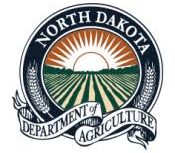
North Dakota Department of Agriculture
BISMARCK – Agriculture Commissioner Doug Goehring has awarded 27 grants totaling over $3 million to promote the development, cultivation, production and sales of specialty crops in North Dakota.
“North Dakota is already a leading producer of several specialty crops, such as dry edible beans, dry peas, potatoes and lentils,” Goehring said. “As our farmers seek to diversify their production, these grants help provide important information through specialty crop research, education, and trade missions.
The U.S. Department of Agriculture’s Agricultural Marketing Service (USDA-AMS) approved $3,286,945.21 for the 2020 grants. Last year, North Dakota was awarded $2,714,601.80 for the grants. The grants are distributed based on a formula that takes into account specialty crop acreage and production value.
Specialty crops are defined in law as “fruits, vegetables, tree nuts, dried fruits, horticulture, and nursery crops, including floriculture.”
Organizations and agencies receiving grants are:
- North Dakota State University (NDSU) – $171,689 to study defining bulking rate of Dakota russet, bannock russet and altura potato tubers.
- NDSU – $27,321 to improve nitrogen fixation in chickpeas.
- NDSU – $68,294 for Field to Fork to increase knowledge and consumption of pulse crops.
- National Sunflower Association – $123,947 to enhance rust resistance in confection sunflower production through next-generation technologies.
- NDSU – $166,505 to analyze genetic variation for salinity enhancement in dry pea.
- NDSU – $99,922 to improve detection capacity and resistance evaluation for control of nematode diseases in potato.
- North Dakota Department of Agriculture (NDDA) – $64,629.40 to educate 4th graders on living agriculture.
- NDSU – $105,630 for managing Sclerotinia head rot in confection sunflowers with bee-vectored clonostachys rosea and partially resistant hybrids.
- NDSU – $71,174 to enhance sustainable raspberry production in North Dakota through non-chemical control of spotted wing drosophila.
- NDSU – $47,973 to screen for pea root rot disease resistance in NDSU breeding lines.
- NDSU – $68,778 to put North Dakota small fruit breeding into action.
- NDSU – $89,870 to study adaptive management response to extreme climatic swings for North Dakota and wine industry.
- NDDA – $49,552.04 to provide schools with resources to understand food safety of specialty crops from North Dakota farmers.
- USA Dry Pea & Lentil Council – $113,640 to increase knowledge and consumption of pulse crops in schools.
- NDSU – $96,639 to increase the competitiveness of local fruit production with tunnel grown strawberry in North Dakota.
- NDSU – $137,077 to bridge technical gaps to increase profitability of dry bean production in North Dakota.
- NDSU – $176,490 to optimize production of pulse sprouts with increased nutritional quality.
- NDDA – $60,283.39 for the Emerald ash borer / Japanese beetle survey.
- NDSU – $67,064 for international market and trade policy analysis for U.S. field peas and lentils.
- North Dakota Trade Office – $98,857 to securing international pulse buyers.
- National Agricultural Genotyping Center – $338,962 to apply advancing ascochyta blight detection in pulse crops through molecular diagnostics.
- National Agricultural Genotyping Center – $157,594 to apply advancing seed-borne anthracnose diagnostics in dry edible beans through lateral flow technology.
- USA Dry Pea & Lentil Council – $67,400 for a North Dakota tour to increase purchase of dry peas, lentils and chickpeas in food aid.
- NDSU – $197,057 to increase total protein content through multi-parent advanced generation inter-cross in dry pea through (Protein-MAGIC).
Dakota College at Bottineau – $107,920.60 to research and demonstrate innovative and sustainable composting methods for specialty crop production.
NDSU – $105,308.40 to optimize foliar fungicide applications and winter rye for improved white mold management in dry beans.
NDDA – $133,000 for international and domestic promotion of North Dakota specialty crops.
NDDA received 43 applications, which were reviewed and scored by a select committee and approved by Goehring. Of the 42 applications, 27 were forwarded to the U.S. Department of Agriculture for final approval.
The application for the 2021 Specialty Crop Block Grant Program for the timeframe of October 1, 2021 to September 30, 2023, will open in early December 2020 and close in January 2021. Applications will then be reviewed, scored, ranked and provided to Agriculture Commissioner Goehring to determine which applications will be forwarded to the USDA for final approval in May 2021. Questions regarding the upcoming application process may be directed to Deanna Gierszewski at 701-328-2191 or scbg@nd.gov.
